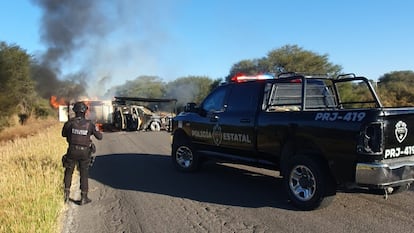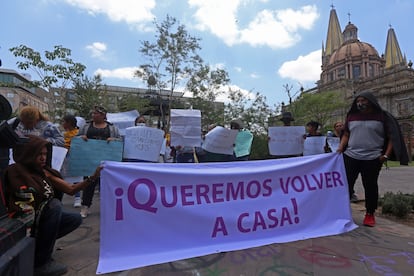Teocaltiche, a town abandoned to violence in Mexico: ‘The people cannot continue living amid fear, violence, and pain’
A police commander was shot dead Tuesday after months of murders of officers, activists, and civilians at the hands of the Jalisco New Generation Cartel


Teocaltiche is a municipality in rural Jalisco, with a population of just under 40,000, near the border with Aguascalientes and Guanajuato. It’s a town that thrives on farming and, in the last decade, increasingly on the monthly remittances sent back home by residents who emigrated to the United States. Teocaltiche is also one of the lands where the Jalisco New Generation Cartel (CJNG) has established its roots, producing bodies dumped in the streets, subservient authorities, and social terror.
Teocaltiche has been abandoned to its fate, ignored by the government of Pablo Lemus of the Citizens’ Movement (MC) in Jalisco, as well as by President Claudia Sheinbaum, residents denounce. Desperate residents are threatening to organize a self-defense group and take the laws they have been denied into their own hands, an old formula already practiced for decades in the neighboring states of Michoacán and Guerrero, which has only contributed to adding fuel to the arsenal of the Mexican countryside.
On Tuesday, a group of hitmen in a pickup truck pulled up alongside the car of the municipal commissioner, Ramón Grande Moncada, and opened fire on him. It was 8 p.m., and the police chief was driving with his wife. Grande Moncada died; his wife, wounded, survived. It was the latest episode in an escalation that has given gravediggers more work than usual in recent months.
The event, narrated this way, is not unlike the executions of police officers, politicians, businessmen, or workers witnessed daily in every corner of Mexico. In Teocaltiche, however, the state Security Secretariat took control of the local police force in the face of the violence that erupted and suspicions that the CJNG was trying to control the town’s agents. Since February 18, the state police have maintained a special surveillance operation. That day, eight police officers and one civilian, their driver, disappeared while traveling to Guadalajara to undergo a routine security check.
A day later, the bodies of four of them were found on the side of the road that connects Teocaltiche with Jalostotitlán, a 25-mile stretch. The bodies had been dismembered to the extent that the remains of four people were scattered in 13 different black plastic bags. Nothing has been heard of the remaining five kidnapped people. The police found a cell phone belonging of one of them and the van in which the officers traveled to Guadalajara, in a neighborhood of Teocaltiche. Investigations suggest this was a settling of scores by the CJNG, because a sign was left next to the bodies accusing the officers of collaborating with the Sinaloa Cartel.
Over the following months, state supervision in the town didn’t seem to change much. On April 9, a few days before Chief Grande’s murder, hitmen arrived early in the morning at the home of another police officer, Luis Ernesto Chávez Regino, 31, pointed their pistols at him, forced him into the yard of the house in the El Tanque neighborhood, and emptied their magazines. Before the state police arrived, on February 2, Officer Sugey Areli López Guzmán died after an on-duty shooting. Two other officers were wounded.
The bullets haven’t only hit the police force. The civilian population has also suffered casualties. On April 7, four people — three men and an elderly woman — were gunned down in a house in the El Barrio neighborhood. Residents heard shouts, an argument, gunshots, and, finally, saw a group of men fleeing the scene in a pickup truck. It’s estimated that some 20 people have been killed since the state police arrived in the municipality in February. Before that: massacres in bars, soldiers ambushed, killings between armed groups...
Violence has thus become routine, but the murder of the commissioner on Tuesday seemed to cross a line. The municipal administration’s Facebook account made a desperate plea for help: “The people of Teocaltiche cannot continue living amid fear, violence, and pain. Today we raise our voices with profound helplessness and indignation over the tragedies that have repeatedly struck our community. Enough of the deaths! Enough of the suffering of our families! Enough of being ignored!” the letter began. “We demand clear and forceful responses from the State and the Federation. We demand real protection for our people. We demand that peace, security, and dignity be restored to our homes,” it added.

The commissioner’s murder struck a chord in the city council that the killing of Juan Pablo Diego Alonzo Estrada, spokesperson for the Teocaltiche Front for Our People collective, had not touched. On the night of March 30, a group of hitmen broke into his home and riddled him with bullets. They also wounded his sister. The activist had participated that same month in roundtable discussions with the Ministry of the Interior to address the CJNG’s control of the municipality. State Governor Pablo Lemus blamed Alonzo Estrada for his own death because, he claimed, he had a record for hydrocarbon theft. It was “completely ruled out,” said Lemus, that he had been killed for his political activism.
The Teocaltiche Front for Our People organized protests this week against the string of murders. On Wednesday, they had called a press conference in the town square to announce the creation of a neighborhood self-defense group in response to “the unstoppable wave of violence that is hitting us and the indifference of the federal authorities.” However, the event was not held due to pressure from the police, who surrounded the square to prevent residents and the press from entering. “The state police once again demonstrated that they have dirty hands and that they have a lot to hide by not allowing us to share our testimonies,” the group denounced.
The Front also attacked Lemus for “pointing out the victims as criminals” and argued that “Jalisco has become a state ruled by infamy, impunity, and violence. Teocaltiche and other municipalities are proof of this. Terrorism, injustice, and fear reign in our communities.” Months earlier, Mayor Margarita Villalobos, of the Institutional Revolutionary Party, had distanced herself from the violence, asserting that the issue was not “her responsibility,” but rather the responsibility of the Attorney General’s Office, and that her jurisdiction was limited to “making sure that the municipality has water and that the garbage is collected.”
Sign up for our weekly newsletter to get more English-language news coverage from EL PAÍS USA Edition
Tu suscripción se está usando en otro dispositivo
¿Quieres añadir otro usuario a tu suscripción?
Si continúas leyendo en este dispositivo, no se podrá leer en el otro.
FlechaTu suscripción se está usando en otro dispositivo y solo puedes acceder a EL PAÍS desde un dispositivo a la vez.
Si quieres compartir tu cuenta, cambia tu suscripción a la modalidad Premium, así podrás añadir otro usuario. Cada uno accederá con su propia cuenta de email, lo que os permitirá personalizar vuestra experiencia en EL PAÍS.
¿Tienes una suscripción de empresa? Accede aquí para contratar más cuentas.
En el caso de no saber quién está usando tu cuenta, te recomendamos cambiar tu contraseña aquí.
Si decides continuar compartiendo tu cuenta, este mensaje se mostrará en tu dispositivo y en el de la otra persona que está usando tu cuenta de forma indefinida, afectando a tu experiencia de lectura. Puedes consultar aquí los términos y condiciones de la suscripción digital.








































